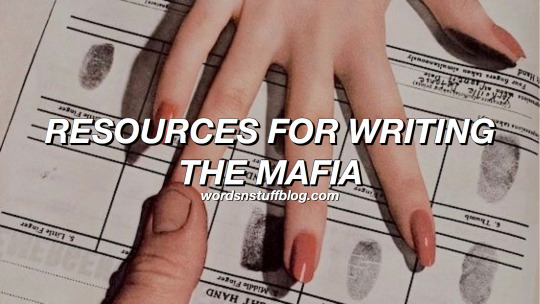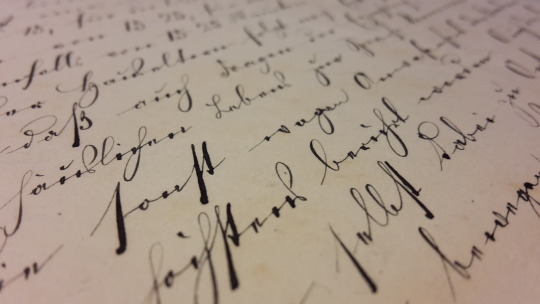Text
As a fic writer, i need every reader to know that:
I don’t care if your comment is coherent. I know what you mean and i love you
I don’t care if you ramble. I read every word and i love you
I don’t care if you leave a comment on a fic from four years ago or leave comments/kudos on like ten of my fics in one go. This isn’t IG, pls stalk my AO3. I love you
I don’t care if you mention the same thing in your comment that four other people have already mentioned. It’s actually really useful to know what resonated with people and I love everyone who takes the time to tell me they liked a particular turn of phrase
I don’t mind if your comment is super long or just a couple of sentences, i love them all
I love you
79K notes
·
View notes
Text
Resources for Writing The Mafia

PLEASE REBLOG | Tumblr suppresses posts with links :/
Patreon || Ko-Fi || Masterlist || Work In Progress
–
The Basics
How The Mafia Works
A Primer on Organized Crime for Writers
Mafia versus mafia
United States Acts Against Organized Crime
Legislative Frameworks & Policing Measures
New Mafia versus Old Mafia
Models of Organized Crime
Historical Origins
Criminal Psychology of The Mafia
Timeline of Organized Crime
Keep reading
5K notes
·
View notes
Text
how to write: characters slowly accepting their sexuality
(Instagram: @MyDearestMay)
As there is more and more lgbtq+ representation in writing, there are certain things that your character might experience, like the struggle with their own sexuality. So here I present you how characters might slowly start to accept their orientation.
Feel free to add your personal experiences!
1 - give them a person they can trust.
The first step to make them accept their sexual orientation is through learning that it doesn’t matter which gender(s) they like. Give them a friend who supports them, who shows them that they are loved nonetheless.
2 - let them meet people from their community.
Talk. Experience. Ask. They should feel comfy and ask others about their experiences. Someone who shows them that they are not alone and that many people struggle with the same things will be a great help.
They can meet people from their community through websites, at specific bars or at pride parades.
3 - religion.
If they struggle to accept their own sexuality because of their religion, let them meet someone with the same orientation and religion. Maybe they meet a gay pastor?
4 - give them time.
They will need a good amount of time until they accept themselves. They will struggle and questions like “But am I really [any sexuality]?” or “What if I’m actually ...?” might keep them up all night. Maybe they spend the whole day in bed while thinking about their sexuality. And that’s fine. They need the time to get aware of themselves.
5 - let them stop labeling themselves and be proud about their sexuality.
Eventually, they’ll realize that it doesn’t matter how their sexuality is called and what gender they like. They are their own person. There might be prejudices they are afraid of, but let them get prouder over the time.
Of course, they might always be insecure, especially in a hate-filled world like ours. But they’ll realize that they matter regardless of their sexual orientation.
I’d love to hear your personal opinions, experiences and tips! Feel free to add them in the comments <3
#writing#writing advice#lgbt#lgbtq#lgbt+#writing tip#book#author#queue it good#lgbtq+#writers#writer#writing prompt#sexuality#writing help#self love#self accepectance
58 notes
·
View notes
Text

#writer#writing#writing memes#writing meme#meme#novel#featuring Curry The Fish™️#writers on tumblr#author#books#writing tips#writing advice
18 notes
·
View notes
Text
gifted kid burnout things that no one seems to talk about:
the raw panic of hearing about your potential, positive or negative
a weird brand of imposter syndrome where you genuinely think you’ve fluked your way through every success and you’re gonna be Exposed as a Fraud
never having learned how to study and having no idea where to start now that you need to
reading college level books as a kid but being basically illiterate now
dismissing your struggles as irrelevant because other people have it harder and i should be smart enough to handle this
feeling like you’ve lost all control over your life (maybe manifesting into depression, anxiety and disordered eating in a grasp for control over something)
being unable to decide on a career path because you could have had everything, only to watch those opportunities disappear as you fail to commit
120K notes
·
View notes
Text
How to write stories in a different time period
(Instagram: @mydearestmay)
Writing a story set in the past can be as pleasing as it can be exhausting. It needs quite some research to get the historical setting right.
But have no fear, even someone with little knowledge about history can write historical fiction.
#1 - Be certain when your story is playing.
I know. It's hard to decide for the exact year, but a rough time period is enough, like 1840-1850.
Why this is necessary? Let's say you write a story in the 20th century, but aren't quite sure in which decade exactly.
However, this will make your research harder than necessary. Compare 1910 with 1990.
In 1910, there was no such thing as a car. People used carriages and wore fancy dresses. In 1990, however, people drove cars, women wore trousers and there have been two world wars years ago.
If you suddenly think hmm, what did men wear in the 20th century?, you'll get either wrong information or too much.
#2 - Research.
This part is actually my favorite, but sometimes it distracts me too much from writing itself.
The most important thing when writing historical stories is research.
Research, research, research.
Now that you've decided for a certain time period, you can search for specific documentaries or blog articles. Maybe your local library has some books about that time or you‘re still in school and have access to a history professor's knowledge. But even if you don't, you can always ask the internet.
If you have spent your whole day trying to find an article about an apothecary's daily routine in the 19th century but didn't find anything, there's no need to cry and give up yet. There are many forums where you can post your questions - personally, I always use Quora, a website/app, where you can ask questions and get them answered by hobby historians, people who just happen to know that answer or maybe even university professors. It's worth a try!
#3 - Read.
This one might be obvious and apply to any genre, but it is incredibly important.
Read books that play in your chosen time period or maybe are written during that time. You're writing about the Victorian England but haven't read a book by Charles Dickens? Writing about WWII but haven't read Anne Frank? Well, your choice, but I would recommend doing it.
Doing that might help you empathize with your story's setting.
#4 - Accept that there will always be inconsistencies.
This is also very important and accepting this might stop you from giving up because of frustration.
You have researched everything you can think of - clothing, manners, houses, architecture, food, etc. You're quite proud of yourself and your brain is stuffed with knowledge from uncountable documentaries and articles.
However, suddenly you read a comment. They didn't use that specific kind of vase at that time. This is very poorly researched, it says.
You have two options:
1 - You feel attacked and frustrated, thinking about just giving up. Why have you wasted your time researching when it was useless anyway (which it obviously wasn't)?
2 - You smile, shrug and continue writing the chapter you've been working at. Maybe you even try to contact the person who has left that comment - after all, they seem to have quite some knowledge on that topic.
The thing is, no one can know everything. You will make mistakes. Everyone does.
My history professor had very much knowledge on WWII. We all adored the many details he had told us, everything very specific, and proofing his passion for the topic. Nonetheless, even we students could tell him new facts about that event sometimes. He could've gotten angry, but instead he was so happy to gain new knowledge.
So the point is, while you should roughly know how people dressed and what customs existed, it doesn't matter that much whether the frame of that painting was made out of oak wood or cherry wood at that time (except you're writing about an artist).
Now you're ready to write your historic fiction!
61 notes
·
View notes
Text
Types of Writers
Writer 1: The writer that never sleeps
Writer 2: The writer who sold their soul
Writer 3: The writer who kills everyone
Writer 4: The writer who doesn’t know what happens next
Writer 5: The writer who researches every tiny detail
Writer 6: The writer who forgets what they’re writing
Writer 7: The writer who never writes
Writer 8: The writer who edits as they write
Writer 9: The writer who disappears for 1.5 years
Writer 10: The writer who is never heard from again
So which one are you?
8K notes
·
View notes
Text
English Surnames - Part 1
(Instagram: @mydearestmay)
Very common surnames
Allen
Baker
Taylor
Bennett
Phillips
Miller
Hill
Graham
Collins
Scott
Not so common/older surnames
Reyes
Everleigh
Holton
Kensley
Dayton
Paxton
Oakley
Marleigh
Kimberley
Brent
#names#character names#surnames#oc names#oc#writer#writing#writers on tumblr#my words#novel#writing advice#writing tips#author#books#fiction#queue it good
39 notes
·
View notes
Text
Italian Names - Part 2
(Instagram: @mydearestmay)
Male names
Leonardo
Emilio
Angelo
Enzo
Roberto
Alonzo
Gabriele
Francesco
Marcello
Amerigo
Female Names
Giulia
Alessia
Vittoria
Beatrice
Nicole
Rebecca
Mia
Benedetta
Laura
If you have any name suggestions, let me know!
#writing#names#character names#oc#oc names#writer#writers on tumblr#writing advice#writing tips#books#author#novel#queue it good
43 notes
·
View notes
Text
Spanish Names - Part 1
(Instagram: @mydearestmay)'
Male names
Mateo
Sebastián
Ángel
Juan
Carlos
Alejandro
Diego
Miguel
Rafael
Ricardo
Female names
Natalia
Sofía
Isabel
Angelina
Catalina
Mercedes
Carmen
Amada
Marta
Teresa
If you have more name suggestions, I'd love to know!
#names#spanish names#character names#writer#writers on tumblr#writing#writing advice#writing tips#books#fiction#character#oc#own character#oc names#queue it good
16 notes
·
View notes
Text
ok but two fighting characters get stuck in an elevator during a storm trope
#tropes#writing tropes#writer#writers on tumblr#writing#books#novel#my words#author#fiction#writing tips
5 notes
·
View notes
Text
some mini collections of tips for writers
(based on things that yours truly notices as a freelance editor. This list is in no way complete, and will probably be added to as I continue to find repeated mistakes)
Dialogue
Use beats in your dialogue to break it up. Even “said” can make a very effective beat between lines.
(No beats: “It’s not lethal. Just highly dangerous with a good chance of being mutilated.” // Beats: “It’s not lethal,” he said. “Just highly dangerous with a good chance of being mutilated.”)
Note how the break allows a bit of a pause for ~dramatic effect
thinking of dialogue, use punctuation and distinct speech patterns! “Life, uh, finds a way.” is an iconic line anyway, but Jeff Goldblum’s signature verbal tic gives it character.
It’s okay if characters stutter. Don’t let the condemnation of stuttering characters as “cringey” in fanfic put you off. (and on that note, fuck cringe culture. Seriously. It saps all the fun out of creativity and fun is important.)
Start! A! New! Line! Whenever! Someone! New! Speaks!!
DO NOT FEAR THE WORD “SAID”
Setting & Blocking
Use the landscape and settings around your character, and always, always remember a scene’s blocking. Where is everything in relation to your characters? Have you left someone holding a coffee cup for the last three scenes? Did you lose a character somewhere along the way?
using the contents of a scene is also great for fight sequences.
Similarly, large character casts are hard to keep track of so don’t be afraid to break them up. Sending someone off somewhere else can create some nifty little subplots.
Keep a personal note of how time passes. Trust me, it’s incredibly helpful to you as a writer and also for future readers.
Characters
Character growth does not have to be positive. Sometimes characters fail or suffer or get their motivations twisted up, and they finish the book as a villain rather than a hero.
All that matters is that a character changes throughout the plot in a way that readers can see; the sort of change they go through is entirely up to you.
scrap the idea that someone has to deserve a redemption arc. They probably don’t deserve it, which is the whole point. So don’t be afraid to make your villains seem completely irredeemable.
and you don’t need to redeem your antagonists in order to make them complex, sympathetic villains, anyway. Sometimes people get so stuck in their beliefs that they can’t see another way and it goes too far. Not everyone comes back from that.
Also, motivations and goals can absolutely change. That’s okay. You just need to have something that drives your character so that your readers are rooting for them.
Protagonists don’t need to be heroic. How you define the protagonists and antagonists in your story is based entirely on the morality in your story-world, NOT the moral ideas in the real world. What counts as a complex protagonist in a world torn apart by biological warfare will be very different than one living in our world.
Prose & Grammar
simple prose is just fine and you don’t need to fluff it up for pretty quotes.
Remember to vary your sentence structures and length. Start smaller and build it up, drawing your reader’s attention.
“And” and “But” are very valid sentence starters that are great for communicating the tone of internal narrative. You’re allowed to tweak grammar if that’s helpful for telling the story, it just needs to be accessible. Test out what you’ve written on other people.
Check that your tenses are consistent!!
25K notes
·
View notes
Text
Writing Tips: Software, Apps, etc. for Writing
(Instagram: @mydearestmay)
Writing software for Windows
While most of you are already aware of Microsoft Word and Google Docs, there are many other options as well. Some are free, some aren’t.
Microsoft Word (Microsoft 360 subscription necessary)
Microsoft Word is a powerful word editor that most people use. However, you need a subscription to use Word.
Google Docs (free)
Google Docs is often used because it is free, saves changes in a document automatically and shows past versions of a document. I personally like Google Docs because I can seamlessly switch between my laptop and my phone.
Scrivener (~50 €)
Scrivener is not only good for writing, but also for plotting the story itself! However, it might be confusing to use at the beginning, but there are many tutorials online.
FocusWriter (free)
FocusWriter offers a distraction-free writing. You can set the background as you like, work in fullscreen and add background sounds. I highly recommend this software if you have a hard time focusing on your writing!
LibreOffice (free)
LibreOffice is a Microsoft Office alternative that also comes with a text editor similar to Microsoft Word. I’ve never tried it out myself, but it appears to be a popular choice.
Writing/Note Apps for iOS
I usually prefer taking notes on my phone instead of paper because I get ideas at the worst moments. Most of these apps mentioned below have a desktop or Android version as well.
Notebook (by Zoho Corporation) (free)
Honestly, this is my favorite notebook app. You can create multiple ‘notebooks’ and add notes. Notebook is free and has a Windows version as well and supports synchronizing between multiple devices, but I’d recommend using it on your phone only.
Bear (by Shiny Frog Ltd.) (free/subscription possible)
Bear used to be my favorite because the surface is so smooth. There are multiple designs available and some formatting options. If you want to synchronize your notes between two or more devices, you need a subscription, but if you only use it on one device (a desktop version for macOS is also available), you don’t need a subscription.
OneNote (by Microsoft) (Microsoft 360 subscription necessary)
OneNote is good, especially for character descriptions, but you need a subscription. Also, I’ve experienced some synchronizing problems in the past, which is the reason why I don’t use it that much anymore. But don’t get me wrong, they might have fixed those problems already and it’s worth a try.
Google Docs (by Google LLC) (free)
I know, I have mentioned Google Docs above already. However, it’s my favorite writing app for my phone because it supports the mobile layout way better than Word (which is also available for iOS but I really don’t recommend Word for iPhone and iPad. Just ... don’t. You’ll get frustrated, believe me.) Google Docs, however, also synchronizes without problems.
Pages (by Apple) (free)
If you have an iPad and don’t want to use Word or Google Docs, you can try Pages. It offers similar features and isn’t that bad either.
Notes (by Apple) (free)
Notes is every iPhone’s default app. Of course, there’s nothing wrong with Notes either and I must admit that its features have improved over the time, but there aren’t many formatting options.
These are just my personal recommendations. Feel free to add more apps or your experiences in the comments!
#writing#writing tips#writing advice#writing apps#writer#my writing#book#books#advice#writing help#writers on tumblr#queue it good
45 notes
·
View notes
Text
latin phrases worth knowing:
(in case you wanted to know because i fucking love this language)
ad astra per aspera - to the stars through difficulties
alis volat propriis - he flies by his own wings
amantium irae amoris integratio est - the quarrels of lovers are the renewal of love
ars longa, vita brevis - art is long, life is short
aut insanity homo, aut versus facit - the fellow is either mad or he is composing verses
dum spiro spero - while I breathe, I hope
ense petit placidam sub libertate quietem - with the sword, she seeks peace under liberty
exigo a me non ut optimus par sim sed ut malis melior - I require myself not to be equal to the best, but to be better than the bad
experiential docet - experience teaches
helluo librorum - a glutton for books (bookworm)
in libras libertas - in books, freedom
littera scripta manet - the written letter lasts
mens regnum bona possidet - an honest heart is a kingdom in itself
mirabile dictu - wonderful to say
nullus est liber tam malus ut non aliqua parte prosit - there is no book so bad that it is not profitable in some part
omnia iam fient quae posse negabam - everything which I used to say could not happen, will happen now
poeta nascitur, non fit - the poet is born, not made
qui dedit benificium taceat; narrat qui accepit - let him who has done a good deed be silent; let him who has received it tell it
saepe ne utile quidem est scire quid futurum sit - often, it is not advantageous to know what will be
sedit qui timuit ne non succederet - he who feared he would not succeed sat still
si vis pacem, para bellum - if you want peace, prepare for war
struit insidias lacrimis cum feminia plorat - when a woman weeps, she is setting traps with her tears
sub rosa - under the rose
trahimir omnes laudis studio - we are led on by our eagerness for praise
urbem latericium invenit, marmoream reliquit - he found the city a city of bricks; he left it a city of marble
ut incepit fidelis sic permanet - as loyal as she began, so she remains
119K notes
·
View notes
Text
Italian Names - Part 1
(Instagram: @mydearestmay)
Male names
Lorenzo
Marco
Giovanni
Luca
Alessandro
Franco
Amerigo
Felice
Mateo
Armando
Female Names
Sofia
Giorgia
Francesca
Arianna
Ilaria
Viola
Gianna
Bianca
Viviana
Angelica
I tried to find some unisex names, but there weren't any results at all. If you know some, I'd love know!
#writing#names#italian names#writer#writers on tumblr#writing advice#writing tips#books#author#novel#my words#book names#character#character names#oc#oc names#queue it good
74 notes
·
View notes
Text
Killing off characters: the shoulds and shouldn’ts
1. Why you should
The death is a major plot point
It reveals some shocking plot twist
It supports your themes/what you’re trying to say with your book
Your novel explores the afterlife
You are George R.R Martin and the selling point of your work is that everybody dies
It suits the genre/mood of your novel
2. Why you shouldn’t
The character isn’t serving any purpose (this isn’t the Sims)
You want your readers to be shocked for the sake of being shocked
You want to be edgy
You think your MG story needs more gore
You want to romanticise grieving/loss
3. How you should
This really depends on your genre and target audience
If you’re writing something that isn’t intended to be graphic/traumatic, you can stick to the impact the death has on the other characters. If your novel explores illness, focus on that rather than on the disturbing death scene itself. Perhaps you’re writing a drama/tragic romance - you might want to ease up on the gore here. For these genres, I would suggest focusing on the emotional aspect of the death - the sobbing, the last words, the bright white lights (whatever floats your boat). Think of Mufasa in The Lion King - the actions are suspenseful, but we don’t see him being trampled with his guts spilling everywhere. But it’s still one of the most impactful deaths in fictional history.
If you’re writing in a more mature and gritty genre (like thriller, dark fantasy or crime), you can go all out. If there’s blood and guts, you readers probably want to see it in vivid detail to get their violence fix for the day.
Whichever genre your novel falls into, you should also go with what feels comfortable to you. Even if you’re writing adult dark fantasy, you don’t have to write graphic violence to make a character death impactful.
4. How you shouldn’t
Please don’t let your character have a three-pages-long monologue after they’ve been stabbed in the throat. It’s not realistic and it’s often very boring. Yes, a few well-written last words can have a great impact. Just make sure that your character would realistically be able to speak at that point and that it doesn’t become a cheese fest.
Unless you’re aiming for very dark/nihilistic humour, afford your characters some dignity in the way they kick the bucket. (e.g. don’t use the phrase “kick the bucket”). Having someone slip on a banana peel and then choke on a pretzel is a little ridiculous and will make the entire story seem silly. Once again, this really depends on what you’re going for. If your genre is serious and your character is important and beloved, try for emotion rather than whimsy.
Don’t let your characters die only to be resurrected again and again and again. Look, I love Supernatural (long may they reign), but even I have to admit that the Winchester brothers’ luck with death has become a bit ridiculous. Doing this takes away from the impact of the death - it removes the fear and suspense, and will leave your readers emotionally stunted.
5. Who you shouldn’t
Your only female character in a bid to make the male hero feel something and become a better person
Your only LGBTQIA+ character, who is just too pure to live in this terrible world
Your only character of colour, who dies to save the white hero
Your only disabled character, who can now finally find release from life with disability
The one character who has never experienced a sliver of joy and bears the brunt of the tragedy, right when happiness is finally within their reach
The main character in the middle of the story - unless you have a REALLY good plan for what happens next
Reblog if you found these tips useful. Comment with your own thoughts on killing off characters. Follow me for similar content.
19K notes
·
View notes









